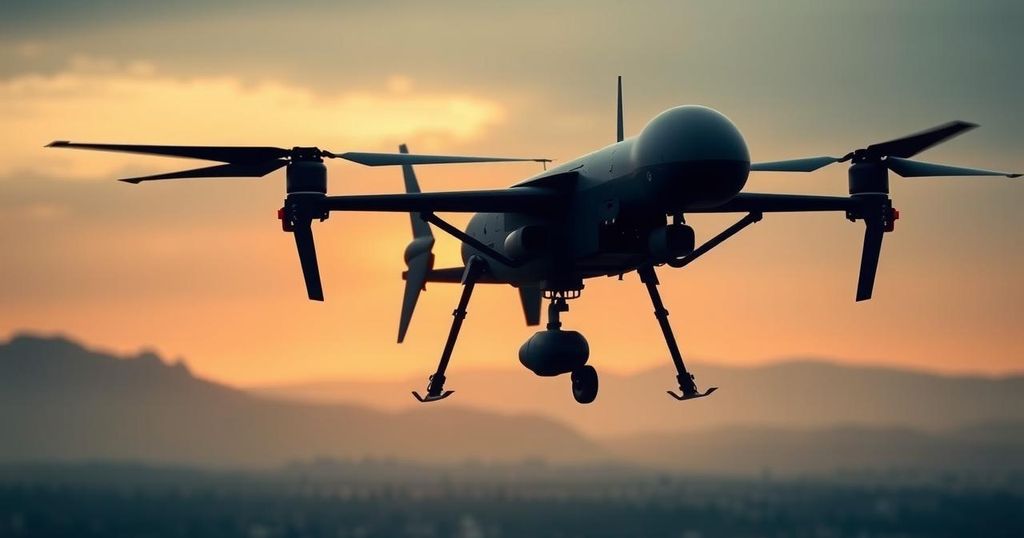Kurdish Official Denies Drone Acquisition Claims from Iran Amid Turkish Propaganda

A Kurdish military official has firmly denied claims that Kurdish forces obtained drones from Iran, framing them as Turkish propaganda. He emphasized that their drone capabilities are developed internally and criticized Turkish media for distorting their image. The official described the current security situation in Syrian Kurdish areas and expressed concerns about Turkish threats to Kurdish autonomy, while also advocating for potential cooperation with Israel amid regional complexities.
A Kurdish military official has categorically denied accusations that Kurdish forces obtained drones from Iran, characterizing the allegations as Turkish propaganda. This statement was made during a video call with The Jerusalem Post, in response to an article in the Turkish press that linked Kurdish militia to Iranian drone capabilities. “We did not acquire any drone capabilities from the Iranians,” the official asserted, emphasizing that their drone technology is developed internally by local fighters. The official criticized the Turkish media for attempting to vilify the Kurdish image, stating that they do so out of desperation due to failure on the battlefield.
The official provided an overview of the situation in Kurdish-controlled areas in Syria, claiming that these regions are currently the safest in the country, under the control of Kurdish forces. According to him, these regions constitute approximately 30-35% of Syria and represent a significant obstacle to Turkish President Erdogan’s ambitions for territorial expansion. He pointed out that ongoing military actions against the Kurds, even though they are a significant part of Syria, reflect a broader regional animosity that has historical roots.
He further articulated concerns about Turkey’s aggressive stance towards the Kurds, who have been caught in a cycle of conflict with both the Turkish state and extremist groups within the region. He noted that while Iran’s influence in Syria may be waning, Turkey remains a formidable threat to Kurdish autonomy, indicating a shared hostility towards Kurdish populations. The official expressed apprehension about the current precarious political climate following the consolidation of power in Damascus, which could lead to worsening conditions for minority groups.
In discussing Israel, the official acknowledged the historical significance of the Jewish people in the region and expressed a desire for cooperation despite the challenging political landscape. He praised Israel’s capabilities in various domains and suggested that its involvement could be crucial in promoting regional peace. Yet, he maintained a cautious outlook given the current volatility and complexity of the geopolitical situation in Syria and the greater Middle East.
The tension between the Kurdish minority and the Turkish state has deep historical roots, primarily stemming from ethnic struggles and the Kurdish fight for independence. The Kurdish population in Turkey is significant, comprising approximately 15-20%, whereas millions more reside in neighboring countries with varying degrees of autonomy. This long-standing enmity has led to numerous confrontations as Turkish forces systematically target Kurdish groups, labeling them as terrorists with connections to the PKK, a Kurdish organization recognized by Turkey as a terrorist entity. In the domains of Syria where Kurds have established autonomy, they face continued threats from both Turkish-backed forces and extremist groups, complicating their security and political aspirations.
The Kurdish military official’s statements underscore the complexities of Kurdish aspirations for autonomy amidst ongoing hostilities from Turkey. Their firm denial of the drone acquisition allegations reveals a broader narrative of misinformation perpetuated by Turkish media. Furthermore, the dynamics of Kurdish self-governance in Syria and its implications for regional stability remain a focal point amid historical ethnic tensions. The call for potential cooperation with Israel reflects the nuanced geopolitical relationships that could influence future peace efforts, albeit within a context of significant uncertainty and risk.
Original Source: www.jpost.com






